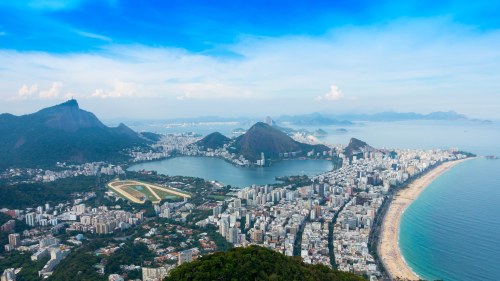Rio's Global Moment

Despite the challenges, Rio has accomplished more in the years preparing to host the Olympics than it could have without being awarded this international honor.
There has been no shortage of news coverage highlighting the challenges Rio de Janeiro faces as it prepares to host the first-ever Olympic Games in South America. Incidents of military police shootings seen as “cleaning up the city” or protesters extinguishing the Olympic flame have made recent headlines. That’s on top of months’ worth of concern about Zika and stories noting construction that isn’t complete, promises that haven’t been met, contaminated water athletes will possibly swallow, and the huge expense of it all. With such worrisome headlines and intense scrutiny from the press, it is a wonder that Rio—or any city—would ever want to host this major international event.
Yet despite all the challenges, this is an extraordinary moment for Rio. It has accomplished more in the years preparing to host the Olympics than it ever could have without being awarded this international honor—investments that are crucial to its future as a global city.
Hosting the Olympics requires an enormous amount of dedication, from raising the funds to solidifying important relationships, to maintaining political will and obtaining support from the national government, among many other resources. Mayors don’t sign up for this overnight or on a whim. They put themselves at risk of intense scrutiny from the world and massive debt that could take years to pay off. They deal with backlash from disenfranchised populations who wish the resources were going toward local problems. Affluent residents begrudge that their local comforts have become popularized. Worst of all, they risk the possible legacy of failing to deliver a spectacular first-class flawless event.
Mayors and city leaders certainly calculate all these factors years before the games actually take place, but they persevere because they understand the transformative power hosting the games can have on the city’s global future. They can tackle a multitude of needed projects that have likely been on their urban agenda for years in a relatively short period of time. They could draw the world’s attention to their city, culture, and heritage for weeks. They bring the world’s best athletes and tourists and sponsors to their city, which boosts the local economy in unprecedented ways. No other strategy can produce so much in such a short period of time.
Rio, considering where it started, has a lot to show, and more people should take notice.
Once Brazil’s capital, Rio was in dire need of an urban facelift and upgraded infrastructure. In preparing for the Olympics, the city invested in urban renewal of the downtown area. According to my friend Washington Fajardo, a Brazilian architect, president of Rio World Heritage Institute, and a special advisor for urban affairs to the Mayor of Rio, the city made more than 300,000 square meters of new public space available. Two new museums have opened, including the new Museum of Tomorrow which inspires people to imagine a more sustainable world.
Urban mobility has significantly improved. With 16 kilometers of new metro line and 150 kilometers of new bus rapid transit, new neighborhoods are connected to the city’s core, slashing the commuting time for residents. A new light rail system with a VLT (vehicle on light tracks) has 27 kilometers of tracks connecting residents around the city and to the airports. By 2017, it will be expected to operate 24 hours a day, serving 300,000 people daily. According to Fajardo, for the first time, Rio has a real connected transportation system.
Rio also renovated the port region, a historic area that had deteriorated by decades of abandonment. Four tunnels, a new viaduct, a new sewage system, and new wells were built. A technologically advanced control center was initiated. An anti-flooding project in the neighborhood of the Barra da Tijuca was launched and new reservoirs were developed. A new park, Parque de Madureira, located in one of the poorest neighborhoods of the city, has opened and residents will be able to watch the games from large screens. All these projects together help more equally distribute urban services throughout the city, in turn “intensively reducing the asymmetrical conditions which defined Rio over the last fifty years,” argues Fajardo.
Rio may not be a perfect city, but few—if any—cities are. And the challenges the city faces would have afflicted Rio and its residents with or without the Olympics. Its leaders would have had to manage the multitude of urban challenges the city faced either way, and it is unlikely they would have found the resources and political support to invest in other significant stimulus and infrastructure projects in the meantime. All these investments and improvements will remain for the residents long after the games are over. Indeed, they were expensive but necessary megaprojects; hosting the Olympics gave the city the ambitious timeline and agenda it needed.
Furthermore, it is noteworthy that Rio is spending far less on hosting the games than Barcelona, Beijing, or London did.
Mayor Eduardo Paes’ is not in an envied position—defending Rio amidst all the local and international criticism—but his bold vision for Rio is admirable. A global city needs a strategic global agenda and a forward-looking leader who makes decisions to benefit our children’s children. Bold leaders embrace legendary Chicago architect and planner Daniel Burnham’s message: “Make no little plans; they have no magic to stir men’s blood and probably themselves will not be realized.”
I vividly remember the disappointment I felt in October 2009 when Chicago was the first city eliminated from the final round of four candidates to host the 2016 Games. I served on the Chicago 2016 Next Generation Leadership Advisory Council for a year, helping build local support for the Olympic bid campaign. We encouraged Chicagoans to understand the great benefits the city would receive from hosting such a major international event. I worked on a 2007 Chicago Council on Global Affairs’ task force report, The Global Edge: An Agenda for Chicago’s Future, which argued that “a winning Olympic bid is one that includes a legacy of civic improvements in infrastructure, housing, and other areas. … In this era, a successful Olympic city, like London or Beijing, is also a successful global city.”
Similarly, Mayor Kasim Reed of Atlanta argued at the 2016 Chicago Forum on Global Cities that hosting the 1996 Olympic Games “changed the city of Atlanta forever and really positioned it to be the most dominant economy in the Southeast.” It had an estimated $5.14 billion economic impact, new sports venues were built, park space was created, sidewalks and streets were improved, universities got new dormitories, and housing patterns were altered. Mayor Reed also pointed out that “the process of securing to host a major event like the Olympic Games created relationships between the civic, business, and political community that last a lifetime and are really unrivaled.” With their stadiums and proven capacity to host large events, Atlanta will host several large sporting events in the coming years, including the Super Bowl in 2019. “I would love to debate anyone that would argue that that moment twenty years ago when we had the Olympics was not time, energy, and passion that was very well spent,” Mayor Reed added.
But even though I was disappointed that Chicago lost this opportunity, I am thrilled that Rio won.
My parents left Brazil in the 1960s and 1970s, at a time when the country was ruled by a military dictatorship. My childhood was filled with stories about Brazilian politics and corruption (not unlike today), and the violence and disorder of Brazilian cities, particularly Rio de Janeiro. Knowing how complex the bid process is and how powerful it had been for some cities, such as Atlanta and Barcelona, I am thankful that Rio has been able to capitalize on the opportunities hosting the games presents and to shine on the global stage.
Rio has come a long way since my parents left Brazil 40 years ago, and, with historic moments like this one, it will look very different forty years from now. Rather than criticize the city’s failures and weaknesses over the next month, I’ll be looking at the incredible accomplishments this beautiful city was able to pull off in such a complicated country and the legacies that will be left behind.

